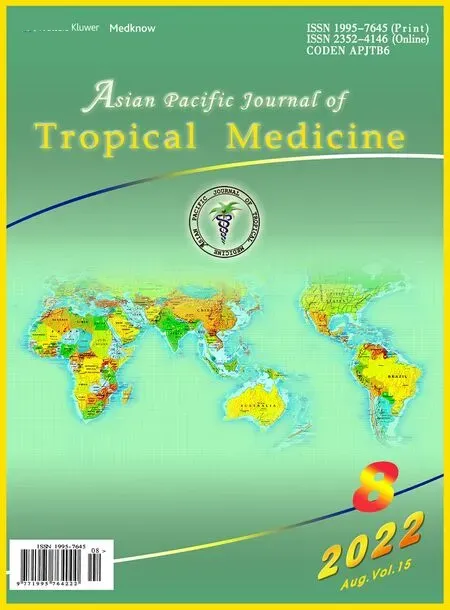Inappropriate antibiotic dispensing and use: A public health threat in the Philippines
2022-11-23EricDavidOrnosElginPaulQuebralJeremyCerialesOurladAlzeusTantengco
Eric David B. Ornos, Elgin Paul B. Quebral, Jeremy A. Ceriales, Ourlad Alzeus G. Tantengco
College of Medicine, University of the Philippines Manila, Manila, Philippines
A high rate of improper antibiotic dispensing was reported to patients with presumed viral infections even without a prescription from a physician in Vietnam[1]. Imprudent antibiotic dispensing and use were also observed in other countries, including the Philippines. A large number of patients experienced respiratory symptoms, such as cough and rhinorrhea during the COVID-19 pandemic, which exacerbated this problem with antibiotic use.
The Philippine Food and Drug Administration strictly prohibits the selling or dispensing of antibiotics without a prescription from a licensed physician. However, patients can still purchase antibiotics without a prescription in the Philippines[2]. Patients perceive that they can easily buy antibiotics even without a doctor's prescription[2]. This high rate of antibiotic self-medication can be attributed to Filipino’s limited understanding of proper antibiotic use. For instance, Filipino mothers usually give antibiotics to their children with coughs even without a doctor’s prescription[3]. Patients also reuse their previous medical prescriptions to get antibiotics from pharmacies. The lack of access to physicians and the high cost of medical consultation also contribute to the rampant self-medication of antibiotics[1].
The COVID-19 pandemic has aggravated the issue of inappropriate antibiotic dispensing. At the start of the COVID-19 pandemic, ivermectin and azithromycin were promoted in the treatment for COVID-19. The Philippine Department of Health and different medical societies recommended against their use due to the lack of evidence that they can prevent COVID-19 infection, decrease disease progression, and reduce the duration of hospitalization[4]. However, some physicians still prescribed these drugs and resisted the directives of health authorities. Unfortunately, the lack of policing for drug dispensing in pharmacies aggravated the dysregulated access of the public to antibiotics[5].
Inappropriate antibiotic use is a threat to public health because it can promote antimicrobial resistance[6]. We call for interprofessional collaboration to promote antimicrobial stewardship. Physicians should be prudent in prescribing antibiotics to their patients. Health workers should educate their patients to increase their knowledge of proper antibiotic use. Pharmacists should also practice appropriate dispensing of antibiotics. We also emphasize the need for regulatory bodies to adequately implement and check the adherence of health workers and pharmacies to the guidelines and regulations on antibiotic dispensing. We call for increased vigilance and commitment among all stakeholders to take immediate action against improper antibiotic use.
Conflict of interest statement
The authors declare no competing interests.
Funding
The authors received no extramural funding for the study.
Authors’ contributions
EDBO conceived and wrote the manuscript. EPBQ, JAC, and OAGT reviewed the manuscript. All the authors approved the finally version to be published.
杂志排行
Asian Pacific Journal of Tropical Medicine的其它文章
- COVID-19's impacts on dengue transmission: Focus on neighbourhood surveillance of Aedes mosquitoes
- Monkeypox: A looming concern for children?
- Panic disorder in COVID-19 patients admitted in a tertiary care hospital in South India
- Burkholderia cepacia outbreak in immunocompetent children in a tertiary hospital in Turkey: A case series
- Assessment of colistin resistance in Gram negative bacteria from clinical samples in resource-limited settings
- Interleukin-15 is a significant predictor of sarcopenia in human immunodeficiency virus infected patients on antiretroviral therapy: A cross-sectional study
